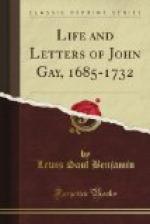One of the immediate results of the campaign was that the apartments that had been granted to Gay in Whitehall, which belonged to the Crown, had, by order, to be surrendered. On the other hand, two large editions, amounting to 10,500 copies, of “Polly, An Opera: being the Second Part of ‘The Beggar’s Opera.’ Written by Mr. Gay. With the Songs and Basses engraved on Copper-plates,” were printed in 1729, and from the sale Gay derived between L1,100 and L1,200.[11] In 1777 Colman produced “Polly” in a revised version, but it failed to attract.
There was an end of Gay’s hopes of Court preferment, that was clear to every one. It was not unexpected. “I wish John Gay success in his pursuit,” Bolingbroke had written to Swift in June, 1727, “but I think he has some qualities which will keep him down in the world."[12] When the worst was known, Arbuthnot wrote to Swift on the following November 30th: “There is certainly a fatality upon poor Gay. As for hope of preferment [at St. James’s], he has laid it aside. He has made a pretty good bargain (that is, a Smithfield one) for a little place in the Custom-house, which was to bring him in about a hundred a year. It was done as a favour to an old man, and not at all to Gay. When everything was concluded, the man repented, and said he would not part with his place. I have begged Gay not to buy an annuity upon my life; I am sure I should not live a week."[13]
* * * * *
It may be that Gay thought that he might in time live down the disfavour at Court in which he had been involved by the Duke and Duchess of Queensberry and his other partisans. He may even have had a momentary hope, in 1730, when the office of Poet-Laureate was vacant that the position might be offered to him, who had written “Fables” for a young Prince. When Colley Cibber was appointed, Gay probably had it brought home to him that his day as a courtier had passed for good and all. Certainly he is credited, though on what authority is not known, with a share in the burlesque, “Ode for the New Year [1731]. Written by Colley Cibber, Esq.,” in which his disappointment is vented in somewhat coarse expression. This begins,
This is the day when, right or wrong,
I, Colley Bays, Esquire,
Must for my sack indite a song,
And thrum my venal lyre.
The King is attacked, and there is a disgraceful reference to the Queen:—
O may she always meet success
In every scheme and job,
And still continue to caress
That honest statesman Bob.
That Gay was furious there is no question, and he attacked Walpole in one of the second series of his “Fables” (which appeared posthumously in 1738), entitled “The Vulture, the Sparrow, and Other Birds,” which concluded:




